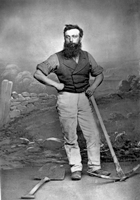Joe Sieg Poem by Alexander Anderson
Joe Sieg
Who are the heroes we hail to-day,
And circle their brows with wreaths of bay?
Is it the warrior back again,
To be girt by throngs of his fellowmen?
The statesman fighting in keen debate
For the laws that will make his country great?
Or the poet, whose spirit in his song
Withers like fire the front of wrong?
Yes, these are heroes on whom we may call,
But a greater still is behind them all.
Who? And we shout, with a ringing cheer,
'Joe Sieg, the railway engineer,
'Who did his duty and never thought
He did any more than a driver ought.
Look at Sieg, I say, as he stands
With the levers clutched in his oily hands,
And hearing naught but the grind of the wheel
On the clanking rail underneath his heel;
Or, lighting his pipe for a whiff or two,
Yet looking ahead as drivers do.
Now, any one seeing him thus would have said,
With a very doubtful shake of the head:—
'Poor stuff after all out of which to plan
Your hero when action calls for the man.'
So you would think, but listen and hear
The story of Sieg, the engineer.
Down the Pennsylvanian line,
In the light of an afternoon's sunshine,
Came Sieg with a train of cars behind,
And hundreds of lives that were his to mind.
Little thought he of danger near
As he watched for signals set at clear.
If he thought at all, and that thought could be said,
As he stood on the footplate looking ahead,
It was this: to do what a driver could do—
Run sharp to his time, nor be overdue.
So along the metals in smoke and glare,
With Sieg at his post by the levers there,
Engine and cars like a whirlwind tore
Till, just as the stoker threw open the door
Of the furnace, at once through each black flue came
The quick back-draught, bringing with it the flame
That, scorching with lightning fingers of pain,
Drove Sieg and his stoker back in the train.
Back they went, bearing all the brunt
Of the fiery tongues that were hissing in front.
They caught at the cars in their wild desire,
That in less than a moment were muffled in fire.
The engine like some wild steed that is free,
Shot ahead with a shriek of defiant glee.
Behind were hundreds of lives in a tomb
That was hot with the breath of their awful doom.
To leap from the trai would be certain death,
To stay would be food for the flame's wild breath.
Now was the time for your hero to plan;
The hour had come, and Sieg was the man.
Not a moment he stood, for at once he saw
His duty before him, and that was law.
Not a single thought of himself came near
To shake his grand brave spirit with fear.
Only there rose, like a flash, in his eye,
As in those when the last stern moment is nigh,
A look that would do all that duty could claim,
And with one wild rush Sieg was into the flame.
The red tongues quivered and clutched at him;
They tore the flesh from his arm and limb;
They wove, like scarlet demons, between
The engine and him a fiery screen.
But he fought his way to his terrible fate
Till he felt his feet touch the tender plate.
Then, blind with the flame and its scorching breath,
And weak from his terrible struggle with death,
He groped for the levers, clutched them at length,
And, with one wild effort of failing strength,
'Mid the hissing of fire and the engine's roar,
Threw off the steam, and could do no more.
When the engine at last was brought to a stand,
Not a life was lost out of all that band.
No life, did I say? Alas! there was one,
But not till his duty was nobly done.
For, back in the tender, silent and grim,
Blackened and scalded in body and limb,
Lay Sieg, who had without aid, and alone,
Saved hundreds of lives and lost his own.
That is the story, plain and clear,
Of Sieg, the railway engineer.
Honour to him, and no stint of praise
From the best of hearts in these modern days.
Honour to Sieg! I say, and hail
This last Jim Bludso of the rail,
Who did his duty, and never thought
He did any more than a driver ought.'
This poem has not been translated into any other language yet.
I would like to translate this poem